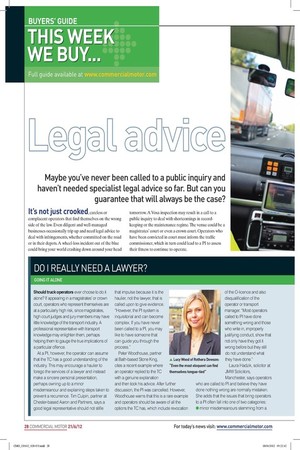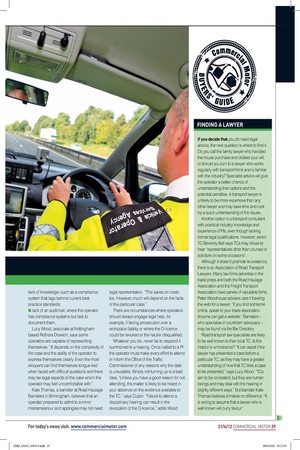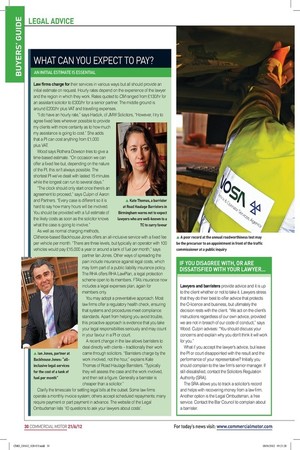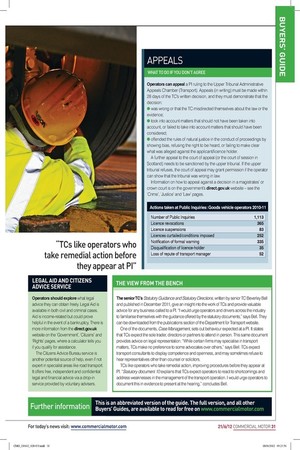THIS WEEK WE BUY...
Page 20

Page 21

Page 22

Page 23

If you've noticed an error in this article please click here to report it so we can fix it.
Full guide available at www.commercialmotor.com
Maybe you’ve never been called to a public inquiry and haven’t needed specialist legal advice so far. But can you guarantee that will always be the case?
It’s not just crooked, careless or complacent operators that find themselves on the wrong side of the law. Even diligent and well-managed businesses occasionally trip up and need legal advice to deal with infringements, whether committed on the road or in their depots. A wheel-loss incident out of the blue could bring your world crashing down around your head tomorrow. A Vosa inspection may result in a call to a public inquiry to deal with shortcomings in recordkeeping or the maintenance regime. The venue could be a magistrates’ court or even a crown court. Operators who have been convicted in court must inform the traffic commissioner, which in turn could lead to a PI to assess their fitness to continue to operate.
DO I REALLY NEED A LAWYER?
GOING IT ALONE Should truck operators ever choose to do it alone? If appearing in a magistrates’ or crown court, operators who represent themselves are at a particularly high risk, since magistrates, high court judges and jury members may have little knowledge of the transport industry. A professional representative with transport knowledge may enlighten them, perhaps helping them to gauge the true implications of a particular offence.
At a PI, however, the operator can assume that the TC has a good understanding of the industry. This may encourage a haulier to forego the services of a lawyer and instead make a sincere personal presentation, perhaps owning up to a minor misdemeanour and explaining steps taken to prevent a recurrence. Tim Culpin, partner at Chester-based Aaron and Partners, says a good legal representative should not stifle that impulse because it is the haulier, not the lawyer, that is called upon to give evidence. “However, the PI system is inquisitorial and can become complex. If you have never been called to a PI, you may like to have someone that can guide you through the process.” Peter Woodhouse, partner at Bath-based Stone King, cites a recent example where an operator replied to the TC with a genuine explanation and then took his advice. After further discussion, the PI was cancelled. However, Woodhouse warns that this is a rare example and operators should be aware of all the options the TC has, which include revocation of the O-licence and also disqualification of the operator or transport manager. “Most operators called to PI have done something wrong and those who write in, improperly justifying conduct, show that not only have they got it wrong before but they still do not understand what they have done.” Laura Hadzik, solicitor at JMW Solicitors,
Manchester, says operators who are called to PI and believe they have done nothing wrong are normally mistaken. She adds that the issues that bring operators to a PI often fall into one of two categories: l minor misdemeanours stemming from a
lack of knowledge, such as a compliance system that lags behind current best practice standards; • lack of an audit trail, where the operator has compliance systems but fails to document them.
Lucy Wood, associate at Nottinghambased Rothera Dowson, says some operators are capable of representing themselves: “It depends on the complexity of the case and the ability of the operator to express themselves clearly. Even the most eloquent can find themselves tongue-tied when faced with difficult questions and there may be legal aspects of the case which the operator may feel uncomfortable with.” Kate Thomas, a barrister at Road Haulage Barristers in Birmingham, believes that an operator prepared to admit to a minor misdemeanour and apologise may not need legal representation. “This saves on costs too. However, much will depend on the facts of the particular case.” There are circumstances where operators should always engage legal help, for example, if facing prosecution over a workplace fatality or where the O-licence could be revoked or the haulier disqualified.
Whatever you do, never fail to respond if summoned to a hearing. Once called to a PI the operator must make every effort to attend or inform the Office of the Traffic Commissioner of any reasons why the date is unsuitable. Simply not turning up is a bad idea. “Unless you have a good reason for not attending, the matter is likely to be heard in your absence on the evidence available to the TC,” says Culpin. “Failure to attend a disciplinary hearing can result in the revocation of the O-licence,” adds Wood.
FINDING A LAWYER
If you decide that you do need legal advice, the next question is where to find it. Do you call the family lawyer who handled the house purchase and drafted your will, or should you turn to a lawyer who works regularly with transport firms and is familiar with the industry? Specialist advice will give the operator a better chance of understanding their options and the potential penalties. A transport lawyer is unlikely to be more expensive than any other lawyer and may save time and cost by a quick understanding of the issues.
Another option is a transport consultant, with practical industry knowledge and experience of PIs, even though lacking formal legal qualifications. However, senior TC Beverley Bell says TCs may refuse to hear “representatives other than counsel or solicitors on some occasions”.
Although it doesn’t promote its existence, there is an Association of Road Transport Lawyers. Many law firms advertise in the trade press and both the Road Haulage Association and the Freight Transport Association have panels of reputable firms. Peter Woodhouse advises care if trawling the web for a lawyer. “If you find someone online, speak to your trade association. Anyone can get a website.” Barristers – who specialise in courtroom advocacy – may be found via the Bar Directory.
Road transport law specialists are likely to be well known to their local TC. Is this helpful or a hindrance? “It can assist if the lawyer has presented a case before a particular TC, as they may have a greater understanding of how that TC likes a case to be presented,” says Lucy Wood. “TCs aim to be consistent, but they are human beings and may deal with the hearing in slightly different ways.” But barrister Kate Thomas believes it makes no difference. “It is wrong to assume that a lawyer who is well known will curry favour.”
WHAT CAN YOU EXPECT TO PAY?
AN INITIAL ESTIMATE IS ESSENTIAL
Law firms charge for their services in various ways but all should provide an initial estimate on request. Hourly rates depend on the experience of the lawyer and the region in which they work. Rates quoted to CM ranged from £130/hr for an assistant solicitor to £300/hr for a senior partner. The middle ground is around £200/hr plus VAT and travelling expenses.
“I do have an hourly rate,” says Hadzik, of JMW Solicitors, “However, I try to agree fixed fees wherever possible to provide my clients with more certainty as to how much my assistance is going to cost.” She adds that a PI can cost anything from £1,000 plus VAT.
Wood says Rothera Dowson tries to give a time-based estimate. “On occasion we can offer a fixed fee but, depending on the nature of the PI, this isn’t always possible. The shortest PI we’ve dealt with lasted 15 minutes while the longest can run to several days.” “The clock should only start once there’s an agreement to proceed,” says Culpin of Aaron and Partners. “Every case is different so it is hard to say how many hours will be involved. You should be provided with a full estimate of the likely costs as soon as the solicitor knows what the case is going to involve.” As well as normal charging methods, Clitheroe-based Backhouse Jones offers an all-inclusive service with a fixed fee per vehicle per month. “There are three levels, but typically an operator with 100 vehicles would pay £15,000 a year or around a tank of fuel per month,” says partner Ian Jones. Other ways of spreading the pain include insurance against legal costs, which may form part of a public liability insurance policy. The RHA offers RHA LawPlan, a legal protection scheme open to its members. FTA’s insurance now includes a legal expenses plan, again for members only.
You may adopt a preventative approach. Most law firms offer a regulatory health check, ensuring that systems and procedures meet compliance standards. Apart from helping you avoid trouble, this proactive approach is evidence that you take your legal responsibilities seriously and may count in your favour in a PI or court.
A recent change in the law allows barristers to deal directly with clients – traditionally their work came through solicitors. “Barristers charge by the work involved, not the hour,” explains Kate Thomas of Road Haulage Barristers. “Typically they will assess the case and the work involved, and then set a figure. Generally a barrister is cheaper than a solicitor.” Clarify the timescale for settling legal bills at the outset. Some law firms operate a monthly invoice system; others accept scheduled repayments; many require payment or part payment in advance. The website of the Legal Ombudsman lists ‘10 questions to ask your lawyers about costs’.
IF YOU DISAGREE WITH, OR ARE DISSATISFIED WITH YOUR LAWYER...
Lawyers and barristers provide advice and it is up to the client whether or not to take it. Lawyers stress that they do their best to offer advice that protects the O-licence and business, but ultimately the decision rests with the client. “We act on the client’s instructions regardless of our own advice, provided we are not in breach of our code of conduct,” says Wood. Culpin advises: “You should discuss your concerns and explain why you don’t think it will work for you.”
What if you accept the lawyer’s advice, but leave the PI or court disappointed with the result and the performance of your representative? Initially you should complain to the law firm’s senior manager. If still dissatisfied, contact the Solicitors Regulation Authority (SRA).
The SRA allows you to track a solicitor’s record and helps with recovering money from a law firm. Another option is the Legal Ombudsman, a free service. Contact the Bar Council to complain about a barrister.
LEGAL AID AnD CITIZEnS ADVICE SERVICE
Operators should explore what legal advice they can obtain freely. Legal Aid is available in both civil and criminal cases. Aid is income-related but could prove helpful in the event of a bankruptcy. There is more information from the direct.gov.uk website on the ‘Government’, ‘Citizens’ and ‘Rights’ pages, where a calculator tells you if you qualify for assistance.
The Citizens Advice Bureau service is another potential source of help, even if not expert in specialist areas like road transport. It offers free, independent and confidential legal and financial advice via a drop-in service provided by voluntary advisers.
APPEALS
what to do iF you don’t agree Operators can appeal a PI ruling to the Upper Tribunal Administrative Appeals Chamber (Transport). Appeals (in writing) must be made within 28 days of the TC’s written decision, and they must demonstrate that the decision: • was wrong or that the TC misdirected themselves about the law or the evidence; • took into account matters that should not have been taken into account, or failed to take into account matters that should have been considered; • offended the rules of natural justice in the conduct of proceedings by showing bias, refusing the right to be heard, or failing to make clear what was alleged against the applicant/licence holder.
A further appeal to the court of appeal (or the court of session in Scotland) needs to be sanctioned by the upper tribunal. If the upper tribunal refuses, the court of appeal may grant permission if the operator can show that the tribunal was wrong in law.
Information on how to appeal against a decision in a magistrates’ or crown court is on the government’s direct.gov.uk website – see the ‘Crime’, ‘Justice’ and ‘Law’ pages.
ThE VIEw fRom ThE BEnCh
The senior TC’s Statutory Guidance and Statutory Directions, written by senior TC Beverley Bell and published in December 2011, give an insight into the work of TCs and provide valuable advice for any business called to a PI. “I would urge operators and drivers across the industry to familiarise themselves with the guidance offered by the statutory documents,” says Bell. They can be downloaded from the publications section of the Department for Transport website.
One of the documents, Case Management, sets out behaviour expected at a PI. It states that TCs expect the sole trader, directors or partners to attend in person. This same document provides advice on legal representation. “While certain firms may specialise in transport matters, TCs make no preference to some advocates over others,” says Bell. TCs expect transport consultants to display competence and openness, and may sometimes refuse to hear representatives other than counsel or solicitors.
TCs like operators who take remedial action, improving procedures before they appear at PI. “Statutory document 10 explains that TCs expect operators to react to shortcomings and address weaknesses in the management of the transport operation. I would urge operators to document this in evidence to present at the hearing,” concludes Bell.











































